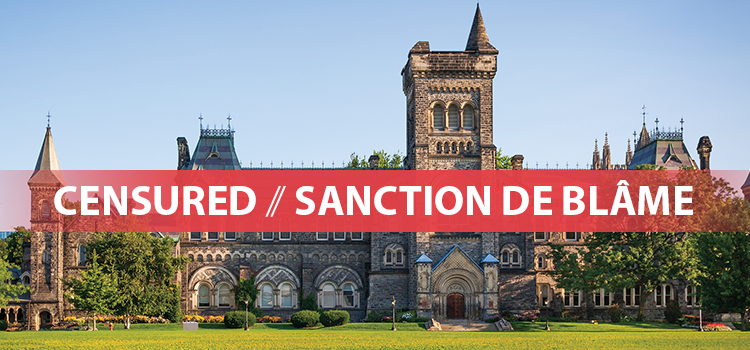
Frequently Asked Questions About Censure Imposed on the University of Toronto
What does it mean to impose a censure?
Censure is a rarely invoked sanction in which academic staff in Canada and internationally are asked to not accept appointments, speaking engagements or distinctions or honours at the University of Toronto, until satisfactory changes are made. It also means that CAUT will widely publicize the dispute in the media and bring the censure to the attention of associations of academic staff in other countries, requesting that they publish an account of the dispute in their journals and asking their members to respect the censure.
I am working with colleagues at the University of Toronto – do I need to stop?
If you are organizing or speaking at an event to take place at the University, we strongly encourage you to cancel, postpone or move the event to another venue for the duration of the censure. You do not need to discontinue ongoing academic work. For example, academic staff from other institutions can continue to serve as external examiners for doctoral defences at U of T.
What actions would bring this censure to an end?
It is critical that the University demonstrates it is acting in good faith with the goal of ensuring that Dr. Azarova can take up the position as Director of the International Human Rights Program (IHRP). CAUT Council will make the final decision as to whether the issues with the University of Toronto have been satisfactorily resolved.
What was the basis for the decision to censure?
CAUT concluded that the decision to cancel Dr. Valentina Azarova’s hiring was the result of outside influence, and as such constitutes a serious breach of widely recognized principles of academic freedom. The hiring process was abruptly aborted following concerns raised by a sitting judge—and a donor to the University—over Dr. Azarova’s academic work on human rights in Israel and Palestine. Facing mounting criticism, the University of Toronto commissioned an external review undertaken by retired Justice Thomas A. Cromwell, but whose mandate did not include determining credibility or plausibility. In its close examination of the facts of the case, CAUT Council found it implausible to conclude that the donor’s call did not trigger the subsequent actions resulting in the sudden termination of the hiring process. The decision to proceed with censure was not taken lightly. It is a measure of last resort used only when CAUT is facing serious violations of academic freedom and other principles that are fundamental higher education.
How did CAUT Council arrive at a different conclusion than former Justice Cromwell?
The Cromwell report’s finding that the Dean’s actions were motivated exclusively by “cross-border hiring issues” and “timing” hinge on the credibility and plausibility of a hard September 30 deadline, the “illegality” of the independent contractor arrangement, and the availability of qualified Canadians. Two members of the Selection Committee state that the consensus of the Committee was a hard starting date was in the fall, prior to January 2021. The third member of the Selection Committee (the Assistant Dean) claims not to recall consensus on either issue. The Cromwell review does not consider these discrepancies or disputes over, interpretation of, facts. Cromwell does not consider whether or why the Dean, after being largely uninvolved in the hiring, suddenly took an intense interest over a long weekend and turned relatively routine administrative matters into insurmountable obstacles.
See more analysis of the Cromwell report:
- Denise Réaume, Faculty of Law, University of Toronto, Visiting Professor, University of Oxford
- Joseph H. Carens, FRSC, Professor Emeritus, University of Toronto
- Alan Freeman, Ipolitics
- Vincent Wong, PhD Student at Osgoode Hall Law School, member of the Hiring Committee for Director of the IHRP, University of Toronto Law School
What can an association or individual academic staff person do to put pressure on the University of Toronto administration to resolve the issues?
A censure is not effective on its own. Together, we must take action to demand that the University of Toronto administration resolve this issue.
You can encourage colleagues to refuse speaking engagements, appointments and distinctions or honours offered by the University. You can also cancel the ones you may have already accepted – and then make your action public on social media using hashtag #UofTcensure, write op-eds and blogs on the importance of upholding censure and make note of the censure in speeches or presentations you make at other universities or institutions.
Censure UofT, organized by a group of concerned University of Toronto faculty, has created a pledge for academic staff to publicly commit to uphold the censure until the university takes appropriate action. Over 1250 have signed.
This pressure is working, but it is not time to slow down. Collectively, we must continue to act and demand that Dr. Azarova is re-offered the position in good faith.
Help spread the word. Share the pledge with your members.
How often has CAUT applied censure?
Censure is a rarely used sanction, and has been applied only 3 times in the past forty years.
For more information:
Read more about CAUT’s detailed procedures relating to censure here.